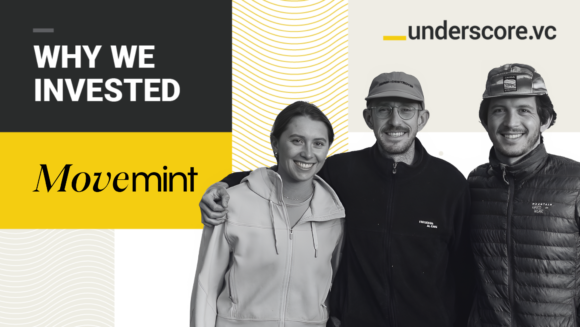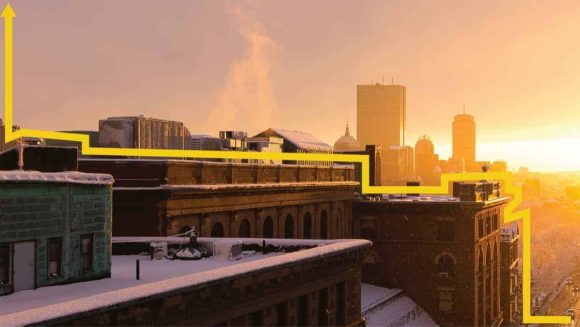Two entrepreneurs harnessing ML to improve work meetings
Our new blog series, “Preparing for Lift-Off: 11 Founders Launching Bold New Startups,” features exclusive interviews with founders from the latest cohort of our UFirst Summer Accelerator program (beginning June 18th). We’re sharing their stories and the daring ideas that are moving their companies forward. We’re excited to be working with them this summer, and hope you enjoy hearing about their journeys thus far and where they’re headed.
We’re kicking things off with John Keck and Ankith Harathi, founders of Marlo, who are using machine learning to drastically improve something that has long needed improving: work meetings.

Currently studying and collaborating at Harvard Business School, John and Ankith have already sparked tremendous excitement with Marlo. Powered by incorrigible curiosity and a vision to create a better workplace, they’re positioned to make major strides this summer and transform Marlo into a must-have for any company.
This is part 1 of 11 of our “Preparing for Lift-Off: 11 Founders Launching Bold New Startups” series created in partnership with Ideometry. Tune in each week for another installment!
Tell us a bit about Marlo.
Ankith: Marlo is your company’s Chief Meeting Officer. Our goal is to make your company’s meetings the best and most productive meetings you’ve ever had. We’re doing this is by creating software that captures microfeedback and other data around interactions in work meetings. Through our data collection, we’re able to finally make meetings measurable. Marlo first diagnoses the problem, understanding the baseline of how effective meetings are being run and visualizing their trends. On top of that, Marlo then provides recommendations on how to improve meeting effectiveness. We’ve achieved the appropriate “diagnosis” and “treatment” through software but also through collaboration with industry experts, behavioral psychologists, and researchers — Because of course, the data is just one side of the story.

How did you come up with the idea?
John: Ankith and I met at Harvard Business School last summer, as we started the joint degree MS/MBA program. We’d both worked at early stage startups before and were each coming to HBS looking to start a company. We literally sat down and said, what kind of things can we start building? What problems in the world do we want to solve? Very quickly the thing that resonated with us was a desire to combine our interests of human psychology and technology. How can we use technology to make people’s lives easier with all the mental clutter surrounding us?
So our first iteration of Marlo was a calendar-event recommendation tool to maximize fulfillment in your personal time. For example, what talks or events on campus you should attend, what concerts or conferences you’d like the best, even when and how often you should take personal time or meditate… all with the idea of using algorithms and machine learning to recommend things for you to do in the future.
As we started pitching to VCs, we kept being told: this is a great idea, but they brought up key questions in creating a target segment and potential monetization options. After speaking to more “customers” we found people don’t manage their personal time with a calendar as regularly, so the lack of existing metadata around their time habits didn’t exist. Further, to potentially monetize, we may have had to advertise certain events to go to, which felt counterintuitive to our original goal of helping people spend their time more productively. But we still liked the idea of helping people optimize their time.
So we asked, where do people spend the most time? We realized people spend most of their time at work, and within work, in meetings. Everyone’s had terrible meetings and no one has really tried to fix that. So we decided we would become the meeting experts and help people diagnose and fix their meetings at work.
We’ve all sat through some inefficient meetings. Can you walk us through an example of how Marlo improves a meeting?
Ankith: Marlo integrates with your existing systems, like Google Calendar, Outlook, Slack, etc. After each meeting, Marlo automatically collects micro-feedback anonymously from each attendee, through pulse surveys crafted in conjunction with research from behavioral psychologists and meeting experts. All of that data gets collected, analyzed, and used to algorithmically calculate the Net Meeting Score of each meeting.
Another area of focus is collaboration. We know who the attendees are for all these meetings, and we can assess how well they’re collaborating with each other, as well as who needs to be in the meeting. So, if you have a meeting where 3 of the attendees didn’t talk, rated it bad, and have no next steps — maybe those people don’t need to be in the meeting. We can identify that and help meeting facilitators only include the people the are necessary. Over time, you can see how these recommendations correlate with a positive Net Meeting Score. It’s a reinforcing system that shows how your changes are improving your meetings.

What is a Net Meeting Score?
Ankith: When we were initially pitching Marlo to investors, we kept getting asked, how do we measure something that’s so qualitative? How can we set a standard for meetings that will help everyone understand ways to improve? We started looking at NPS — Net Promoter Score. It’s been evangelized as an industry standard across consumer services. Companies use it to understand how effective their product is. We asked, how can we create NPS for meetings? So we made NMS — Net Meeting Score. It’s a metric that combines qualitative and quantitative inputs to benchmark your meetings.
We also remove certain biases in the Net Meeting Score calculation, like Facilitator/Speaker Bias. Those who organize or take up more air time in meetings are likely to think the meeting was more productive than it actually was, at the expense of other attendees in the meeting. Ultimately, we’re able to accurately capture everything that’s happening in a meeting, but in a simple way that can be quantified, trended, and measured.
What does the world look like when Marlo succeeds?
Ankith: As companies scale, they start to adopt software like Slack to help facilitate communication throughout their company, and we want Marlo to be part of that standard playbook for companies that are scaling. We want managers to be thinking, OK, now it’s time to get Marlo as our Chief Meeting Officer, so all our meetings are Marlo meetings.
John: If we can have people start measuring this as a KPI for their organization, that’s already a win. We want to grow larger and larger, but in the near term, it’s exciting to say this is a paradigm shift in the way people are looking at what has historically been a qualitative thing.
What drew you to UFirst? What are you hoping to get out of it?
John: We met the Underscore team at a serendipitous lunch at the business school. We happened to be sitting next to Sherman Leung, an Underscore Investment Associate, and Jenni Goodman, Underscore’s Community Manager, and we really hit it off. As first-time founders, we weren’t sure what to expect from VCs, but very quickly we found they were really easy to talk to and really know their stuff in terms of building companies. Once we found out about the UFirst program, we knew we had to apply.
Prior to being selected for UFirst, how far along were you in building your start-up?
Ankith: We actually just launched Marlo within HBS to measure class effectiveness at the end of January. We ended up getting lots of traction — much more than we anticipated. We had other people from the school asking to use it, and now HBS IT is actually very interested in the data we’ve been collecting and exploring how they can use it for their internal organization.
What is your expectation at the close of the UFirst program?
Ankith: We have more companies wanting to use Marlo than we can currently service with our concierge-style MVP, so there’s a current waitlist of companies to get onboard. We know there’s a market demand out there and it’s up to us to meet that demand in a way that delights customers. This summer our goal is to unlock the scalability of this product, build up our team, and be able to seamlessly add Marlo to any company that wants it.
Being an entrepreneur, what are some of the biggest challenges you’ve faced along the way?
John: The big thing on my end is there is so much to learn, whether about building the product, learning how to fundraise, hiring team members, so many things. Being vulnerable and being willing to ask seemingly stupid questions at the early stage has been both the hardest and the most beneficial thing for me. As an entrepreneur, you have to be willing to swallow your pride and ask as much as you can in order to learn as much as you can.
Starting a business is no easy task. What is the driving force that gets you out of bed every day and motivates you to build your business?
Ankith: Curiosity. Nobody is saying we have to make this product. A lot of entrepreneurs are afraid to fail, and I think that never really goes away, but for me, my curiosity drives me even harder than that fear. I’m so curious to discover what we can do.
John: I completely agree. On top of that, getting early validation has been extremely motivating. We’ve seen that this is an issue that nearly everyone in the business world has to deal with. So building something that millions of people could use is a big motivator for us.
Tune in every Wednesday for the next ten weeks as we release new interviews from our “Preparing for Lift-Off: 11 Founders Launching Bold New Startups” series.
This series was created in partnership with Ideometry. Ideometry is a Boston-based full-service marketing agency serving a global client base. With a full suite of creative, development, and strategic services, Ideometry helps startups and Fortune 500 companies alike get the business results they’re looking for. If you’re doing something interesting, we’d love to hear from you. Get in touch with us at ideometry.com or email hello@ideometry.com










